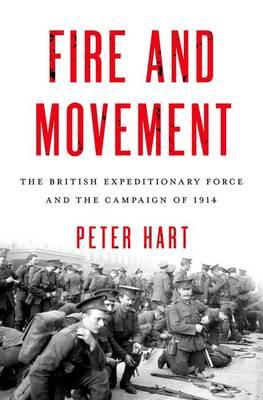Peter Hart has been Oral Historian at the Imperial War Museum since 1981. He has written a number of books about various aspects of the First World War, including Gallipoli and aerial warfare. His latest book is Fire and Movement, which takes a fresh look at the British Expeditionary Force in August 1914.
In this book you look at some of the myths that have grown up around the British Expeditionary Force (BEF) in 1914. How far do you feel that anything new can be said about the First World War?
It is not so much that anything new can be said - it is that ideas and concepts hitherto largely the province of historians and academics can be presented to a wider audience in a manner which is readable and entertaining. This is greatly helped by using carefully sieved personal experience accounts to bring the mingled drama, horrors and dark humour of the battlefield home to the reader. Popular histories often merely regurgitate myths based on wishful thinking and wartime propaganda. This is especially the case early in the war where we have the legend of the 'Old Contemptibles' of the BEF on the Western Front in 1914. Sheer nonsense that ignores what the Germans and French Armies - the main fighting forces during the huge Battle of the Frontiers and the Battle of the Marne - were doing in favour of nationalistic breast-beating myths. The real story of the BEF is far more believable and interesting. We should take pride in what people actually achieved - not in popular myths.
 You mention that the British had prepared for war 'but not for the type of war that faced them in 1914'. Why was the actual war different to what was expected?
You mention that the British had prepared for war 'but not for the type of war that faced them in 1914'. Why was the actual war different to what was expected?
There are a variety of reasons. It is always difficult to prepare for the unknown, armies nearly always reach back to their last major conflict for inspiration and a tactical guideline. In the British case this was the Boer War which proved sadly misleading. Little could be gained in preparing for a continental war with armies counted in millions, by analysing skirmishes with Boer guerrillas. The eventual British success based on fast-moving columns and blockhouse bases, led to a fixation with mounted infantry (later overthrown) and light artillery. Officers were thinking, developing their tactics and bringing in new weapons, but Britain had no large-scale training grounds on which to have full-scale realistic exercises. Budgetary constraints imposed by the government also meant that identified needs - such as more machine guns - were refused on financial grounds. Britain was not alone in this problem, but her situation was far worse as she had allotted most of the defence/war budget to the Royal Navy the force on which the whole British Empire depended. The army was a small afterthought, deployed with little strategical analysis to bolster the French Army. Thus the BEF was thrust into a continental war for which it was not prepared.
You've now written many books about the First World War, what is it about this conflict that keeps you coming back for more? What First World War books have inspired you?
I have always been fascinated in the Great War since I saw the television series in the 1960s and began reading the veterans published memoirs as a young bespectacled geek. Of these I particularly remember the Joseph Murray book Gallipoli As I saw it and the John Terraine masterpiece, Douglas Haig: The Educated Soldier. When I began to work as the oral historian at the Imperial War Museum back in the 1980s I had the pleasure of interviewing over 150 veterans in great detail - of which one was Joe Murray who recorded over 20 hours - wow! The synthesised results are finally being published in August of 2015 - in some ways the culmination of my professional work. I think I was attracted to the war because we all wonder how we would have coped with those nightmarish conditions and the hell of 'going over the top'. At first I was filled with a fury at the 'stupidity' of the generals.
Later on, I was taught the reality by a combination of the veterans, my colleagues and some brilliant historians like John Terraine. Now I find the sheer complexity of the war mindboggling, there was no 'easy way' to victory and if you engage in continental warfare with a major power then hundreds of thousands of men will die. Put bluntly: to beat the German Army you have to kill 2-3 million of the best trained and equipped soldiers in the world. This is a murderous business however you look at it.
Do you have any thoughts around how public libraries can engage with the First World War centenary?
I think the Great War is not something to be celebrated. Personally I am interested in the war as a historical event to be studied and understood as widely as possible - the sentimental centenary side of it passes me by a bit. Yet I fully accept that we should never forget all those on all sides who died or had their lives ruined in that terrible conflict. I just think their memory is best served by establishing what really happened to them and why. Having said all that then Canterbury Library seems to be on the right track! Making historical resources freely available so that people can look up relatives/local people and see what they wore, how they lived and where/why/how they fought. Small on-site displays can be very effective in sucking in interest. Online exhibitions are great and the use of social media including Blogs, Facebook and Twitter feeds can help increase awareness of our subject. Booklists are great in leading people towards a new world of learning - as long as they are not merely a list of books spouting mythologised nationalistic rubbish. The centenary could be an opportunity to gain a realistic perspective; but it could be a disaster if we fail to challenge historical untruths - or as some would call them - lies.
See our page on WW100 commemorations.




Add a comment to: Looking again at 1914 – an interview with military historian Peter Hart